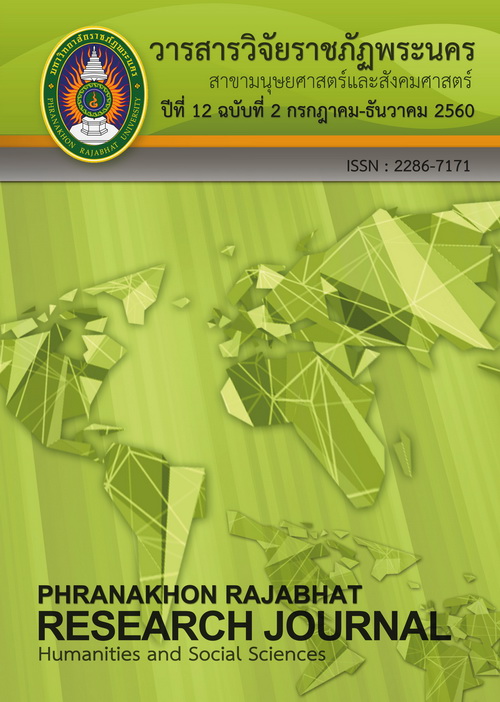A GAME-BASED LEARNING APPROACH TO IMPROVE STUDENTS’ LEARNING ACHIEVEMENT IN DATA FLOW DIAGRAM COURSE
Main Article Content
Abstract
were bachelor degree students of Department of Computer and Information Technology, King Mongkut’s University of Technology Thonburi, who were studying in 2nd semester, academic year 2016, derived
from simple random sampling. The research instruments were 1) the educational computer games in order to improve students’ learning achievement in Data Flow Diagram course, 2) learning achievement pretest and posttest, and 3) evaluation form of students’ satisfaction. The data was statistically analyzed by mean, standard deviation, and paired sample t-test. The results of the research show that the game-based learning approach to improve students’ learning achievement in Data Flow Diagram course have significant improve upon students’ learning achievement. The posttest scores of the students (x =30.15, S.D. = 3.29) were significantly higher than the pretest scores (x = 11.71, S.D. =4.38) (t = 26.09, p<.05). The students satisfied with the game-based learning approach to improve students’ learning achievement in Data Flow Diagram course at the level of “much” (x = 3.81, S.D. = 0.8). The research can be concluded that the game-basedlearning approach to improve students’ learning achievement in Data Flow Diagram course has decent quality and be able to provide for related educators as references
Article Details
Each publish articles were copyright by Phranakorn Rajabhat University
Any contents which appeared in each articles in the journal were authors personal opinion. It did not relate to Phranakorn Rajabhat University and other instructors in the university. Each authors would take responsibility on their articles. If there are any mistake, the authors will take responsibility themselves
References
system analysis course. Procedia -Social and Behavioral Sciences, 31,669-675.
Ebner, M. & Holzinger, A. (2007). Successful implementation of user-centered game based learning in higher
education: an example from civil engineering. Computers & Education, 49(3), 873–890.
Engel, R.J. & Schutt, R.K. (2005). The practice of research in social work. Thousand Oaks, CA: Sage Publications.
Gravetter, F.J. & Forzano, L.A.B. (2009). Research methods for the behavioral. Belmont, CA: Wadsworth Cenage
Learning.
Hwang, G.J., Sung, H.Y., Hung, C.M. & Huang, I. (2012). Development of a personalized educational computer
game based on students’ learning styles. Educational Technology research & development, 60(4), 623–638.
Hwang, G.J., Wu, P.H. & Chen, C.C. (2013). An online game approach for improving students’ learning performance in
web-based problemsolving activities. Computers & Education, 59(4), 1246-1256.
Likert, R. (1932). A Technique for the measurement of attitudes. Archives of Psychology,140, 1-55.
Lowenstein, A.J. & Martha, J.B. (2004). Fuszard’s innovative teaching strategies in Nursing. Sudbury, MA:
Jones and Bartlett.
Prensky, M. (2001). Digital game-based learning. NY: McGraw-Hill.
Sung, H.Y. & Hwang, G.J. (2009). A collaborative game-based learning approach to improving students’ learning performance in science courses. Computers & Education, 63(1), 43-51.


